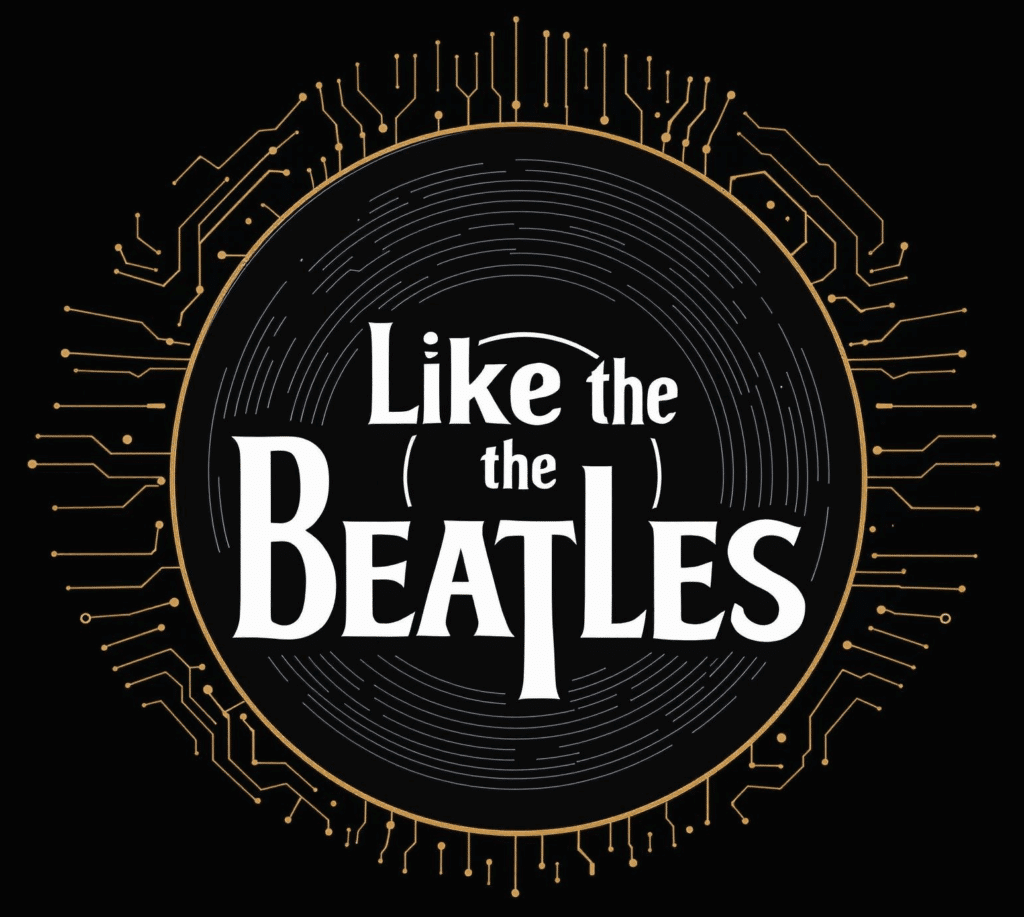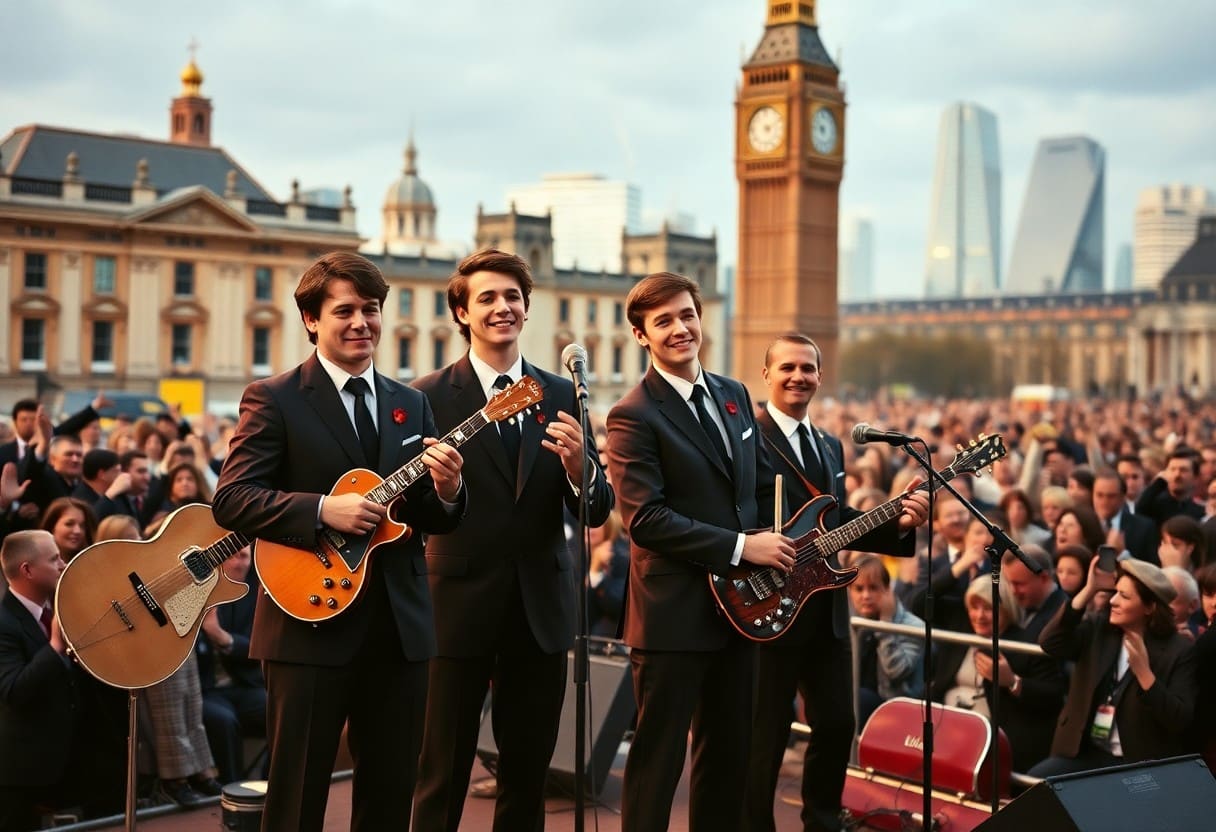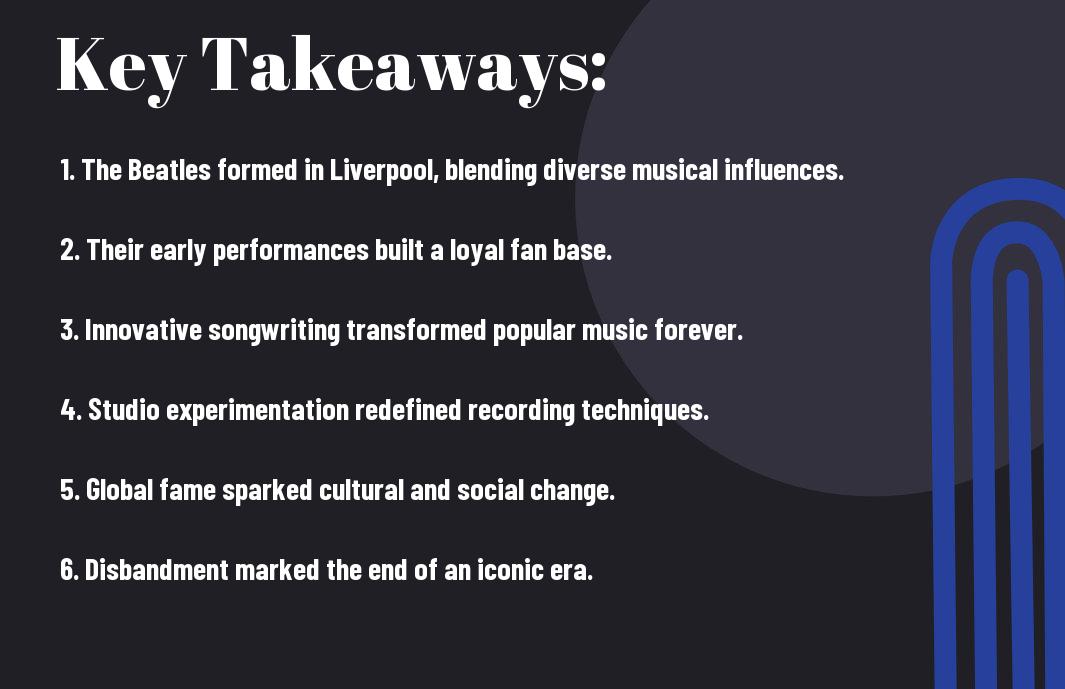You are about to explore the captivating journey of The Beatles, a band that transformed music forever. In this blog post, I will take you through 10 vital steps that outline their incredible rise, influential creative phases, and eventual legacy. Each step reveals the triumphs and challenges they faced, shedding light on what made their story one of the most iconic in music history. Join me as we explore how this remarkable band evolved from humble beginnings to eternal stardom.
The Formation of The Beatles
While the journey of The Beatles is a captivating tale, it all began in Liverpool, where a shared passion for music brought together four young men who would change the world. This grassroots formation involved multiple bands and evolving dynamics, highlighting the organic growth that would ultimately lead to their legendary status. Each member contributed unique elements, setting the stage for their unparalleled collaboration.
The Early Years in Liverpool
Beside the vibrant streets of Liverpool, the early years provided the fertile ground for the future musical icons. Clubs and dance halls thrived, offering opportunities for aspiring musicians to perform. This bustling environment played a pivotal role in shaping their sound, as they experimented with various genres and influences, fostering a sense of camaraderie that would later become their hallmark.
The Original Lineup and Influences
Behind the formation of The Beatles, the original lineup consisted of John Lennon, Paul McCartney, George Harrison, and Ringo Starr, each bringing distinct backgrounds and musical tastes that influenced their collective sound. Drawing inspiration from early rock and roll icons, British skiffle, and American pop, they forged a unique style that resonated deeply with audiences.
Considering the journey of the original lineup, I see how those early influences shaped The Beatles’ unmistakable sound. The powerful combination of John’s edgy lyricism and Paul’s melodic prowess set a strong foundation. Add to that George’s innovative guitar work and Ringo’s steady rhythms, and you have a band ripe for exploration. This diversity not only allowed them to evolve but also introduced various genres, from rock and roll to psychedelic pop, reflecting their personal and artistic growth which captivated millions worldwide.
Rise to Fame
You can trace the meteoric rise of The Beatles to the early 1960s, when their distinctive sound and style captured the imagination of the public. It marked an era of musical transformation, and their youthful energy resonated with countless fans. This was the time when four young men from Liverpool would change the landscape of popular music forever.
The Breakthrough with ‘Love Me Do’
An unforgettable moment in music history occurred when The Beatles released their first single, ‘Love Me Do,’ in 1962. It quickly caught the ear of listeners, showcasing their fresh sound and harmonies. The success of this early hit not only laid the groundwork for their future career but also marked their arrival on the national music scene.
The Beatlemania Phenomenon
Against all odds, The Beatles sparked a cultural phenomenon known as Beatlemania, a frenzy of excitement that swept across the globe. Fans, especially young girls, would scream and faint at their concerts, showcasing the intense passion that the band inspired. This unprecedented level of fame was both exhilarating and overwhelming, as their music spread rapidly.
Even as Beatlemania reached dizzying heights, it came with its challenges. The group faced overwhelming crowds and intense media scrutiny, creating a whirlwind of obsession that was both positive and dangerous. This fervor not only defined the early 1960s music scene but also introduced the modern concept of celebrity, showing just how powerful their influence had become while testing their resilience as artists.
Musical Evolution
Once again, I find myself captivated by The Beatles’ transformative journey. Their musical evolution not only showcased their incredible versatility but also reflected the shifting cultural landscape of the 1960s. As they transitioned from catchy pop tunes to more complex and innovative sounds, they pushed the boundaries of what music could be, influencing countless artists in the process.
Experimentation with Sound
Against the backdrop of a changing musical landscape, The Beatles embraced experimentation with sound, boldly incorporating diverse genres and unconventional techniques. This spirit of innovation led them to explore studio technologies, resulting in groundbreaking tracks that challenged listeners’ perceptions and expectations. From using tape loops to reversing recordings, their adventurous approach set the stage for modern music production.
Iconic Albums and Their Impact
Between their remarkable discography, The Beatles produced iconic albums that reshaped the music industry landscape and inspired generations of musicians. Each album introduced groundbreaking ideas, creativity, and complex themes, expanding the possibilities of popular music and art.
Understanding the impact of The Beatles’ albums reveals their profound influence on both culture and the music industry. Albums like Sgt. Pepper’s Lonely Hearts Club Band and The White Album not only encapsulated the spirit of the times but also represented a new kind of artistic expression. Their use of diverse genres and innovative production techniques laid the groundwork for future artists while challenging societal norms. The universal themes and captivating narratives in their music continue to resonate with audiences, highlighting the lasting power of their creative legacy.
The Global Expansion
All eyes turned to The Beatles as they transcended their British roots, rapidly becoming a global phenomenon. Their captivating melodies and innovative sound captivated audiences worldwide, leading to tours across continents that solidified their status as icons. Each performance attracted massive crowds and showcased their extraordinary talent, making them a household name everywhere.
Touring and Worldwide Recognition
The Beatles’ relentless touring across Europe, America, and beyond played a pivotal role in securing their worldwide recognition. They broke records and set benchmarks for live performances, drawing unprecedented crowds that often erupted into chaotic admiration. Their music resonated globally, reaching diverse cultures and establishing a fanbase that spanned multiple generations.
Cultural Influence Beyond Music
After establishing themselves in the music industry, The Beatles significantly impacted various aspects of culture, including fashion, film, and social movements. Their artistic innovations and avant-garde style often set trends that resonated beyond the music scene, effectively challenging societal norms and shaping public attitudes.
And their influence didn’t stop with music. The Beatles were trailblazers in fashion, inspiring countless trends with their distinctive styles, from the iconic suits to the bohemian look of the late ’60s. Their fame and charisma also set the stage for future musicians and countless artists, highlighting themes of social change through their lyrics, such as peace and love, which paralleled the counterculture movements of their time. The Beatles not only shaped the musical landscape but also served as cultural icons, demonstrating the profound impact of their artistry on society and lifestyle across the globe.
The Breakup
After a meteoric rise to fame and countless innovative moments, The Beatles faced their inevitable dissolution in the early 1970s. Personal differences, evolving individual interests, and outside pressures ultimately unraveled the band that changed music history. The creative bond that once united John, Paul, George, and Ringo weakened over time, leading to a painful yet necessary separation that defined a generation.
Internal Conflicts and Creative Differences
Across the years, the dynamic within The Beatles shifted dramatically. With each member exploring personal artistic visions, tensions grew. Disagreements about song direction, recording processes, and individual aspirations caused rifts, making collaboration increasingly difficult. The vibrant energy that once fueled their creativity gave way to disputes, as contrasting ideas clashed, and personal ambitions took precedence.
The Official Split and Aftermath
At the start of 1970, the official announcement of The Beatles’ breakup shocked fans worldwide. Each member pursued solo careers with varying degrees of success, but the fallout had its repercussions. Tensions lingered even as they moved on; the love and camaraderie they once shared became overshadowed by disputes, particularly between John and Paul. This disbandment not only marked the end of an era but also paved the way for individual artistic exploration.
In fact, the aftermath of the split revealed both personal growth and significant challenges for each member. John Lennon emerged with a strong political voice, while Paul McCartney sought to maintain a pop sensibility. George Harrison blossomed as a songwriter, delivering the acclaimed “All Things Must Pass”, yet Ringo struggled to find his footing initially. The transition was marked by legal battles over finances and rights, stirring up lasting animosities. Nonetheless, this chapter was not entirely bleak; it showcased their resilience and creative independence, influencing countless artists and shaping the music landscape for decades to come.
Legacy and Influence
To understand the profound A History of the Beatles, it’s imperative to explore the band’s legacy and influence. Their groundbreaking music and innovative approach reshaped the landscape of popular culture, influencing countless artists across genres and generations. Even decades after their breakup, The Beatles remain relevant, inspiring fans and musicians alike to explore their extensive catalog and artistry. Their impact is woven into the very fabric of music history.
Enduring Popularity and Recognition
Enduring through time, The Beatles have achieved an unparalleled level of popularity and recognition worldwide. Their iconic songs and albums continue to attract new listeners, demonstrating lasting appeal across all age groups. This ongoing interest ensures that their music remains a central part of cultural conversations, celebrated in various forms, from films to tribute bands, thus keeping their spirit alive.
Influence on Future Generations of Musicians
After analyzing their music, it’s evident that The Beatles set a precedent that many aspiring musicians strive to emulate. Their innovative songwriting and recording techniques laid the groundwork for modern music. Numerous artists cite them as a major influence, incorporating elements of their artistry into their own work. The Beatles not only changed the music industry but also established important trends in album construction and promotional strategies, encouraging creativity and leading to a more diverse musical landscape.
Influence from The Beatles can be seen in nearly every genre today. Their experimentation with sound and willingness to push boundaries inspired countless artists to explore new musical styles and themes. This boldness led to a wave of creativity that reshaped music as we know it. Many musicians often draw from their innovative spirit, crafting songs that reflect a similar ethos that The Beatles introduced over half a century ago. By observing their approach, you can gain insights into not just music, but the art of storytelling through song.
Summing up
So, as I reflect on the legendary journey of The Beatles, I hope you’ve gained insight into the ten pivotal steps that shaped their remarkable story. From their humble beginnings in Liverpool to global superstardom, each phase of their career offers valuable lessons in creativity, collaboration, and resilience. You can appreciate how their music not only transformed the landscape of popular culture but continues to inspire generations. I encourage you to explore their discography and history further, as it’s a testament to the enduring power of innovation and the human spirit.












